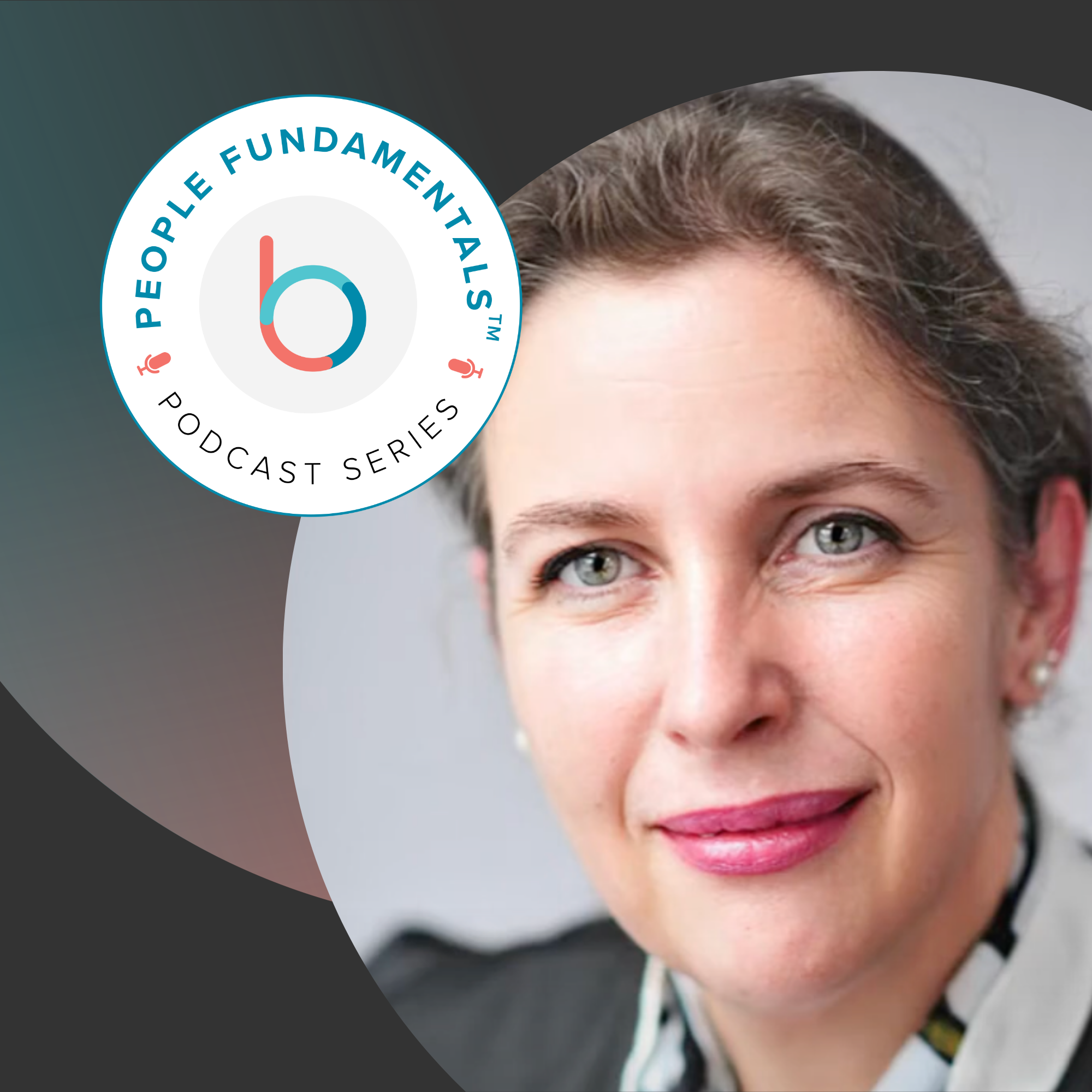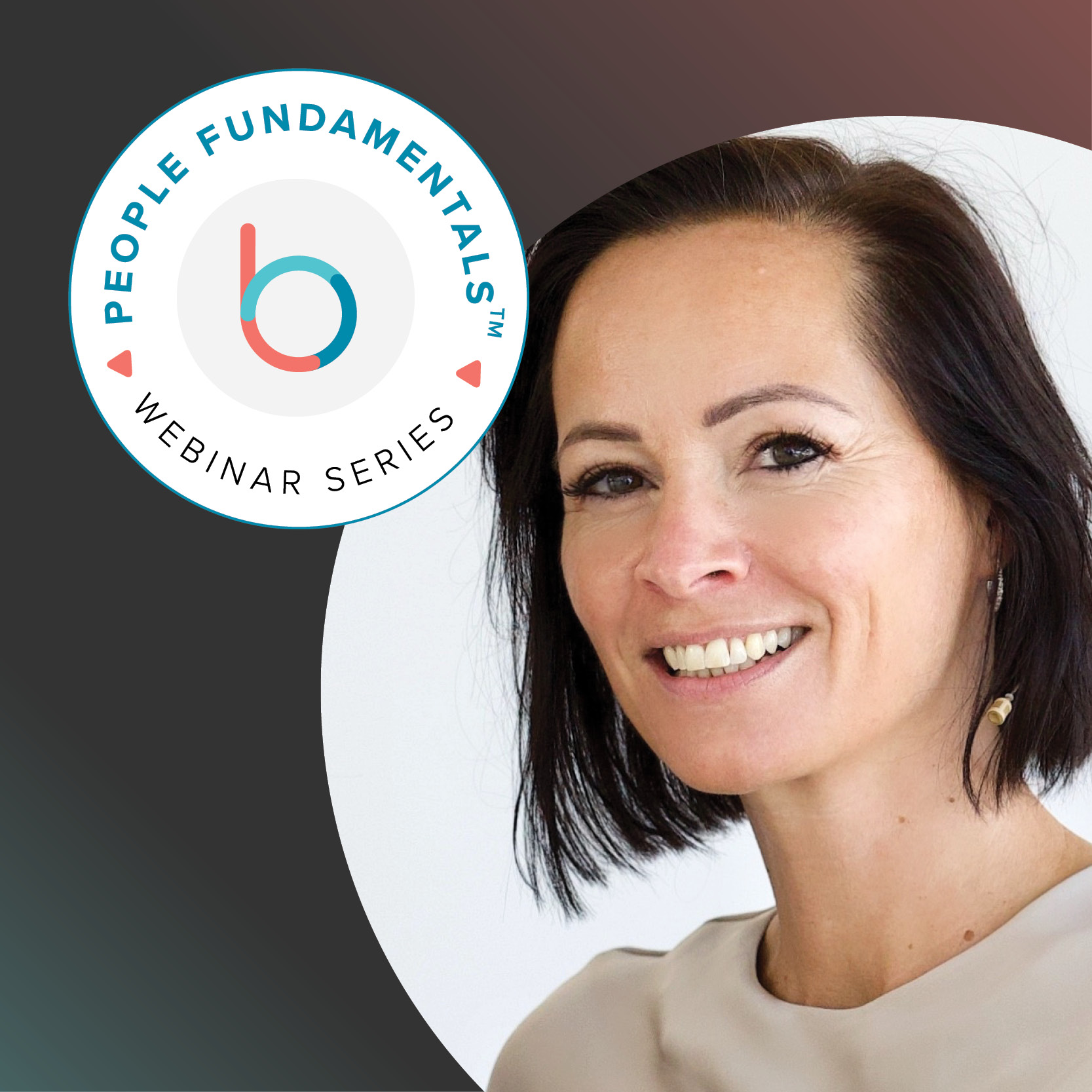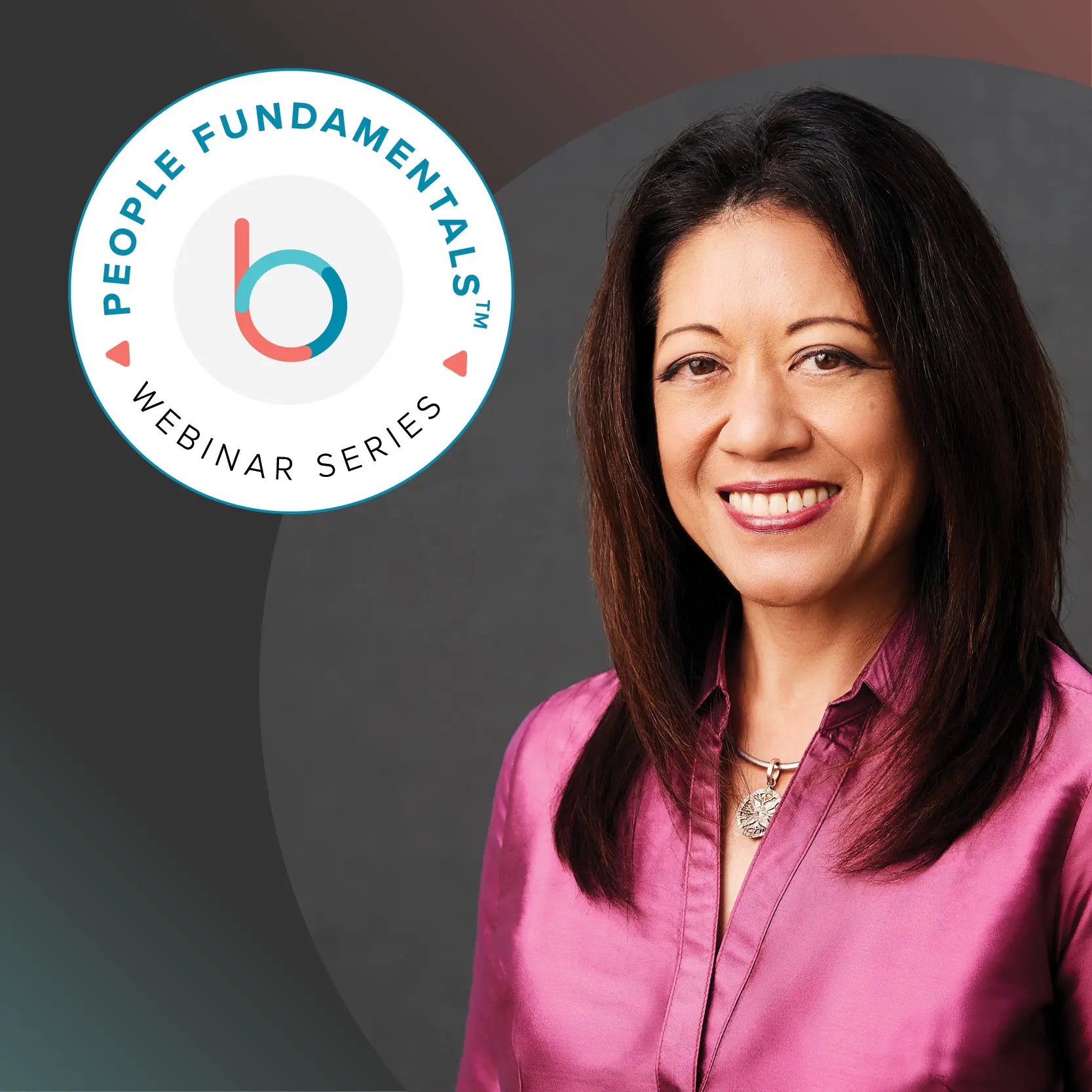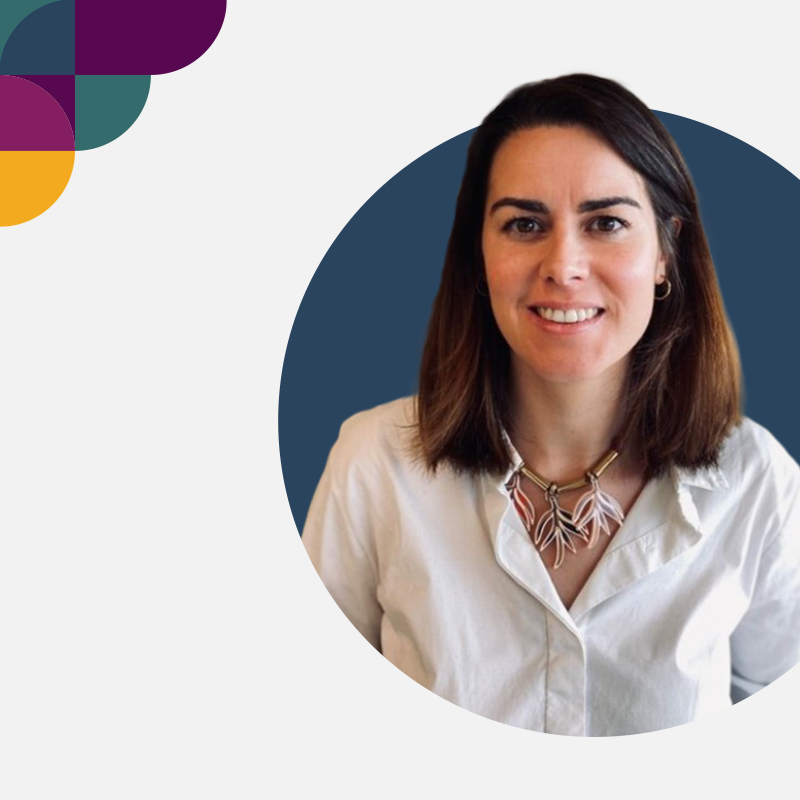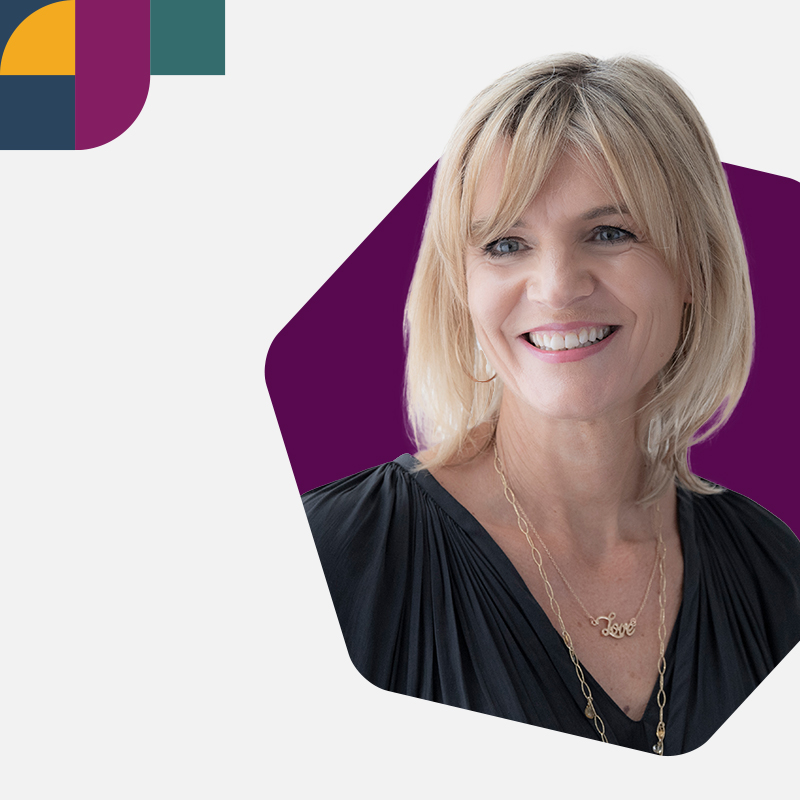On this episode of People Fundamentals, I’m joined by Evelyne Van Vosselen, founder and managing director of evol.ve HR Consulting. Evelyne brings a visionary perspective to the role of HR, redefining it as a driving force behind business success rather than a traditional administrative function.
“We’re there to do the paperwork, to do the legwork on hiring, firing, making sure that payroll works, people get paid,” she says. “But actually, in my aspirational view or perspective of the HR function, I think HR is capable of much more and to be a real strategic, impactful player in any organization.”
Together, we explore how you can prioritize strategic alignment, foster curiosity within your team, and adopt systemic thinking to elevate your impact.
In this conversation, recorded live at Unleash World 2024 in Paris, Evelyne shares her perspective on the importance of aligning HR with business strategy and embracing a holistic approach to workforce management. Listen in as we uncover actionable strategies to make HR a transformative force in your organization.
Subscribe wherever you listen to podcasts: Apple Podcasts| Spotify | YouTube Music
Turning HR into a strategic powerhouse
Evelyne believes that for HR to drive meaningful change, it must transcend its traditional administrative roots and integrate deeply with the organization’s strategic goals. This begins by aligning HR programs with measurable business outcomes, ensuring every decision contributes to broader goals.
“Where we look at the future of the organization, where we look at the current talent that we have, we have to remember — and we have to remind our internal clients — that the decisions we make in a talent management process will determine the future of the organization,” Evelyne says, “because the future leaders that we identify today will design the future strategy.”
She emphasizes that HR’s greatest potential lies in your ability to influence organizational structure and workforce planning. By focusing on these areas, you architect the future by putting the right people in the right roles to achieve strategic goals.
Data plays a pivotal role in this transformation. Evelyne highlights the importance of using analytics to demonstrate HR’s impact. “We finally have data to learn to talk business language,” she says. “And I think that is thanks to the technology that we see today, and where before a lot of things were difficult for us to prove and to underline, now the data, the proof points are at our fingertips.”
To implement this vision, create a clear framework for connecting your work to business priorities. From succession planning to compensation strategies, Evelyne encourages HR teams to always ask, “How does this initiative drive our organization forward?”
Fostering curiosity to build more effective HR teams
Curiosity is central to Evelyne’s approach to professional growth within HR. She sees continuous learning and business acumen as non-negotiable for HR professionals aspiring to drive strategic outcomes.
“We need to cultivate, first of all, that sense of curiosity. We need to go out and learn about the business that we’re supporting,” Evelyne says. She challenges HR teams to move beyond internal processes and immerse themselves in the organization’s broader landscape. This includes engaging with other functions, learning to speak the language of business, understanding key business drivers, and asking thought-provoking questions to uncover new solutions.
Evelyne likens curiosity to a muscle that strengthens with practice. She recommends intentional habits like maintaining a learning journal. “It forces you … to reflect and process what you’ve heard, which otherwise we may skim over and not really assimilate in what we’re doing,” she says. This not only reinforces learning but helps you remain adaptable in a constantly evolving environment.
To foster this mindset across teams, Evelyne suggests introducing cross-functional mentorship programs and encouraging HR professionals to step out of their comfort zones. “I think everyone will be surprised, if you show that level of interest, how easily doors will open to you,” she says.
Seeing the bigger picture: systemic thinking in HR
Evelyne’s third pillar for transformative HR leadership is adopting a systemic approach. She argues that HR must view itself as an interconnected ecosystem where every process — from recruitment to employee development — supports organizational goals.
“Nothing happens in splendid isolation,” Evelyne says. “And that is true for the role of HR in an organization, as a function, but it is also true for all the different bits and pieces within HR.” For example, workforce design and individual employee upskilling are deeply linked.
Systemic thinking also requires a focus on interdepartmental collaboration. Evelyne stresses the importance of breaking silos and aligning with other business units to create cohesive strategies. When HR operates as part of an integrated system, you can anticipate challenges and address them proactively.
To illustrate this point, Evelyne uses an analogy: “I live in Belgium. If I want to go to the UK, I need a different means of transportation than if I want to go to Rome,” she says. “Getting clarity on that sense of direction, and understanding that intimately, should really be the driver of all your actions.”
People in This Episode
Evelyne Van Vosselen: LinkedIn
Transcript
Evelyne Van Vosselen:
When I look at how HR is maturing or not maturing, you can see that the function actually was considered, and still sometimes is considered, as a pure administrative function, right? We’re there to do the paperwork, to do the legwork on hiring, firing, making sure that payroll works, people get paid. But actually in my aspirational view or perspective of the HR function, I think HR is capable of much more and to be a real strategic, impactful player in any organization because we do hold a couple of key processes in HR that are determining the future of an organization.
Ashley Litzenberger:
Hi, and welcome to Betterworks’ People Fundamentals podcast. I’m your host, Ashley Litzenberger, Senior Director of Product Marketing. Betterworks’ core belief in People Fundamentals revolves around helping HR lead through constant change by focusing on core values like fairness, support, balance, and enabling growth opportunities for employees.
These tenets empower everyone in the workforce to strive for excellence, to foster creativity, and to acknowledge each other’s contributions. Betterworks believes that strategic HR leaders can translate these principles into action, shaping their workforce for the better and helping drive meaningful business outcomes. And in this show, we’re diving even deeper into these principles by listening to experts share how you can make them come alive at your organization.
In this episode, recorded live at Unleash World 2024, we’re exploring the evolving role of HR with our special guest, Evelyne Van Vosselen. Evelyne is the founder and managing director of Evolve HR Consulting and a thought leader who is passionate about transforming HR into a truly strategic partner for business success.
Evelyne shares her insights on how HR leaders can use data and systemic thinking to strengthen their impact and move beyond traditional administrative roles to become the drivers of business outcomes. She also emphasizes the importance of curiosity, collaboration, and aligning HR processes with broader strategic goals to ensure long-term success. From reimagining talent management, to building bridges with other functions, Evelyne offers a fresh perspective on how HR can shape the future of work.
Her advice will give you actionable strategies to elevate your team and organization. So tune in and get ready to learn how to make HR a driving force in your business’ success.
HR has long been underestimated and perceived as an administrative function, but Evelyne challenges us to see its potential as a strategic powerhouse. She explains how advancements in technology and data are enabling HR to take a more impactful and business-driven role to shape the future of their organization.
Evelyne Van Vosselen:
I think it’s an exciting moment in the evolution of HR. When I look at how HR is maturing or not maturing, you can see that the function actually was considered, and still sometimes is considered, as a pure administrative function, right? We’re there to do the paperwork, to do the legwork on hiring, firing, making sure that payroll works, people get paid. But actually in my aspirational view or perspective of the HR function, I think HR is capable of much more, and to be a real strategic, impactful player in any organization because we do hold a couple of key processes in HR that are determining the future of an organization.
And the opportunities we see today is to help HR mature to that more strategic, impactful player in an organization because we finally have data to learn to talk business language. And I think that is thanks to the technology that we see today, and where before a lot of things were difficult for us to prove and to underline, now the data, the proof points are at our fingertips, and if we learn to leverage them in a good way, we can really grow up as a function and claim those more strategic board level or EXCO level positions. So that’s why I think it’s a very exciting moment, because everything should be easier.
Ashley Litzenberger:
Evelyne makes a great point about how HR’s role is evolving, but it’s not just about being more strategic, it’s about connecting every layer of the workforce to the bigger picture. She explains how aligning team structures and individual development with business goals can set organizations up for real success.
Evelyne Van Vosselen:
The skill set that HR leaders should have and the vision and the perspective that they should have, they should not only look at the people themselves, but really look at all the various levels where they can play in an organization. So it means combining a strategic view on how is this workforce going to be? How do we need to structure and set up the workforce to achieve the strategic objectives that we have? The role that we play there in the organizational design and development, and then all the various levels below.
Then how do we set up the teams for success? So what does it mean from the right sizing an organization, making sure that people have the right capabilities, making sure that they’re motivated, that they’re correctly paid, all the way down to the individual level. And when I say down to the individual level, that can be looking at people at various stages of their careers and making sure that they’re set up for success and that they’re being set up for success.
And just to talk about the impact that we can have, just to pick one process maybe as an example, I think about talent management, where we look at the future of the organization, where we look at the current talent that we have, we have to remember, and we have to remind our internal clients, that the decisions we make in a talent management process will determine the future of the organization because the future leaders that we identify today will design the future strategy and will set the strategic objectives and therefore will be so critical in the survival of the organization. And I think that’s why it’s so exciting to be in HR today. It’s just that world of opportunity.
Ashley Litzenberger:
Evelyne reminds us that while HR is instrumental in supporting the organization, it’s just as important for HR leaders to invest in their own growth. By staying curious and building a deep understanding of the business, we can elevate HR’s credibility and ensure our work truly drives meaningful impact.
Evelyne Van Vosselen:
As the saying goes, we’re very good at looking after everyone else except for ourselves. So we need to apply the same principles to ourselves as HR leaders independent of the level, and we need to cultivate, first of all that sense of curiosity. We need to go out and learn about the business that we’re supporting. We need to really deeply understand it so that we can come with the right solutions and provide the right level of feedback to the organization and how they can grow, and that’s going to help us become more credible.
So for me, it means learning to be very curious about the business we’re in, about the world that we’re in, and capture those learnings. It also means that we need to continue to learn and develop ourselves. And so that curiosity hopefully will also help people go out and learn about other functions, learn about, really, the clockwork mechanics of the organization and understand what the key element is that they need to learn in order to continue to grow.
Now, this may sound a little bit abstract, but it’s really about making sure that everything you do is connected to that business. So it’s important to move away from that notion of doing HR for the sake of HR and just going through the motion of the processes, but really think like a business leader, and that’s going to be the critical differentiator to continue to grow your career as well.
Ashley Litzenberger:
Evelyne’s analogy reminds us of how critical it is to understand the direction and purpose behind our actions in HR. She highlights what we can do to become truly aligned and drive meaningful outcomes.
Evelyne Van Vosselen:
It’s like knowing where you go on a holiday. I live in Belgium. If I want to go to the UK, I need a different means of transportation than if I want to go to Rome, Italy. So if I want to go to Rome, I can get into my car and drive. If I want to go to London, I cannot, right? I am going to run into some issues. And understanding, getting clarity on that sense of direction, and understanding that intimately should really be the driver of all your actions.
I actually dream of being able to run HR as a function where every single thing we do has a direct impact on the organization’s bottom line and strategic objectives. And if we don’t do that, then we probably are still doing too much of the busy work and not of the real work. If it’s not structurally set up for HR people or other joiners and people wherever they are in their career path to be able to exchange with the other functions in your organization, then certainly it should be your own responsibility to show that curiosity and to just reach out to people.
And I think everyone will be surprised if you show that level of interest how easily doors will open to you, so you can do that on your own. I try to make a point of making sure that my HR team is connected to the business and that they have regular updates with business leaders, so I bring them into my HR all-hands calls, but there’s multiple other ways of doing that. You could all, in some companies there are formal or informal mentoring programs where you can really be very selective about who you would ask to be your mentor. And those are very powerful teams for the informal learning part. And then of course there are some more formalized ways of doing this, but it’s just so powerful and usually other leaders are super happy to be able to share what they’re doing and what is core to their role.
Ashley Litzenberger:
She builds on this idea by showing how HR as a connected system can help leaders not only prepare for senior roles, but also align their actions to create meaningful organization-wide impact.
Evelyne Van Vosselen:
If you’re getting ready and preparing for that senior level role, what I think is really important is to remember to see everything in a holistic way, as a system, because nothing happens in splendid isolation. And that is true for the role of HR in an organization, as a function, but it is also true for all the different bits and pieces within HR. And I think it’s extremely important to have sufficient curiosity as well for all of the niche areas within HR and understand how they reinforce each other and how to help HR be more successful in achieving or supporting the strategic goals of an organization. And I think that’s very important.
So I see a lot of people that think, “Oh, I’ve been an HRBP for such a long time. I’m ready to do something else.” But what have you done to prepare yourself to embrace also a more broader HR perspective? So that curiosity should go towards the full organization and the various functions and roles that you see there. But I think also within HR, how can you make sure that when you play that symphony that you know which buttons to push at what time? So it’s like doing accompagnement on the piano and making sure that those align well. And that’s really putting on your systemic thinking hat, which I think is really important.
Ashley Litzenberger:
Evelyne’s focus on seeing HR as a system ties perfectly to the need for curiosity and adaptability. She shares the keys to drive meaningful growth in an ever-changing world.
Evelyne Van Vosselen:
One of the most critical skills that we can have in HR, and outside of HR, is that curiosity and that desire to continue to learn and grow because the world keeps changing and it’s a boutade, but that’s not going to stop. But always having that business need in mind- I’m one of those people who gets easily sidetracked and excited about new tech, and I have to stop myself a little bit. I have to make sure that I don’t just go for the flavor of the month. I really have to make sure that whatever I do links to those business needs that we have. Although that being said, and this is me maybe with a little wink, but sometimes new technology can also inspire you to not just solution a need, but also to go beyond and to go a bit further. So it’s that balancing act somewhere that we all need to think about.
I’m smiling because I come from an artistic family. My dad has made comics all his life, and my mom was a teacher in an art school. Anyway, but I think it’s that level of curiosity and having an open mind, and I mentioned that notion of being, feeling like a five-year-old, or asking people to treat you like a five-year-old. Well, that also feeds your own curiosity and your own perspective on the world is how people help and support your growth. But how you open up to it as well, like a five-year-old. And I think that’s one of the most important competencies that we can have, is to have that openness and to have that curiosity.
Ashley Litzenberger:
Developing curiosity and adaptability doesn’t just happen by chance. It takes intentional effort. Evelyne shares how we can turn curiosity into a skill we actively strengthen over time.
Evelyne Van Vosselen:
Having some kind of learning journal can be really helpful to make it really tangible and practical, and to not depend just on our own sort of thinking and perception, which is of course colored because we often hear what we want to hear and we understand what we want to understand. So that’s why I like going back to notes that I’ve taken and how did that inspire me? But also you could do that exercise in a very intentional way. Like everything, it’s practice and it’s being very intentional about what you do.
So what I like to recommend to people, and what I’ve done in my past, is to keep a journal and a diary to help myself be focused on what is it that I want to learn? Maybe prepare some questions, but then also after the meeting or after the session, or after the conversation, write down what struck you. Write down some of those elements that were new to you. And I think the more intentional we are about our own development, the better we grow and the better we evolve.
So being curious is a muscle and like going to the gym, it’s a workout that you can practice and there’s lots of tools out there and lots of questions that you can prepare to train yourself on asking questions. But it’s not just about asking questions, it’s also about then listening to understand. And if you keep those in balance, and writing a learning journal has been very helpful to a lot of people. It’s really a good tool. It’s also something that you can go back to, but it forces you as well to reflect and process what you’ve heard, which otherwise we may skim over and not really assimilate in what we’re doing.
Ashley Litzenberger:
Intentional learning doesn’t just help us grow. It shapes how we approach challenges and opportunities. Evelyne builds on this idea by sharing how preparation and thoughtful reflection can make personal development more meaningful and impactful.
Evelyne Van Vosselen:
What I typically recommend and what I like to do is to think about the session ahead of time and say, “What are some key questions that I can come up with that I would like to ask or that I would like to get an answer for?” Make sure that you also link those questions to your own growth, your own development, and your own needs, right? So is this question going to provide me hopefully with an answer that I can then work with, or that I can implement in my day-to-day life?
Ask those questions. Then after the session, after the meeting, the intervention, go back, write down the answers you received and look for the discrepancies. And so what else do I need to clarify? How is this going to change how I function? How is this going to drive my behavior? What else do I need to do?
And by recording that, you actually make your learning more intentional and therefore faster. We have to remember that we’re continuously learning, whether we realize it or not.
Ashley Litzenberger:
Evelyne highlights how intentionality can transform not just your learning but the direction of your entire career. She explores how curiosity can unlock new insights and fuel more meaningful development.
Evelyne Van Vosselen:
The more intentional you are, the more sense of direction you can give to your own growth in your own career. And I think that’s what makes a difference, right? It’s here, now, all of a sudden you’re in the position where you can take control over your own learning and tie it back to what you want to do and what you need to do, and be very selective there. I think it’s a very important exercise.
When you read Carol Dweck’s books, you will see that she also recommends similar ways of controlling your own learning and making it deeper and assimilating it in a better way. So I’m not just the only one, it’s just not me inventing something, but there’s a lot of research around that as well, for those who are curious in a different way and like to read books, for instance.
Ashley Litzenberger:
Evelyne’s insights remind us that learning isn’t something we do in isolation. It’s about connecting with others who can expand our perspective. She reflects on how these connections can help HR professionals grow and navigate the challenges of a sometimes lonely role.
Evelyne Van Vosselen:
Look at other business leaders and try to build a robust mentoring relationship, I would say, with a business leader. It’s going to give you great insights. It’s going to help you grow and develop. Make sure that you network within the profession. HR can be a very lonely job. It’s really good to connect with other HR professionals and learn from each other. Very often, we’re not sharing business secrets, but we’re sharing how we look at the world and how we think about the world. I think those are very important.
And then of course, there’s a lot of formal learning that you can do as well. If there’s various areas or niche areas in HR that you haven’t touched on earlier, but I think as a key sort of maybe wrap-up element, say, same as for any other business function, be curious, broaden your strategic perspective and learn to think strategically and learn to make decisions.
Ashley Litzenberger:
As we wrap up today’s conversation with Evelyne, let’s consider how we can transform HR into the strategic powerhouse she envisions. Her ideas challenge us to rethink not just what HR does, but how it shapes the future of our organizations.
First, prioritize strategic alignment. Evelyne highlighted how HR can play a transformative role when it moves beyond traditional functions and connects directly to the business’ strategic goals. Whether it’s through talent management or workforce design, ensuring every HR initiative ties back to measurable business outcomes is key.
Second, cultivate curiosity within your HR teams. Evelyne emphasized the importance of understanding the broader business landscape and continuously learning. Encourage your teams to develop a deep understanding of the business they support. Explore new ideas and ask thoughtful questions to uncover better solutions.
Finally, embrace systemic thinking. Evelyne’s perspective on HR as an interconnected system reminds us to look at the bigger picture. From organizational design to individual employee development, consider how every piece of the HR puzzle reinforces and supports the organization’s success. These strategies are about elevating HR’s role and ensuring it’s a driving force behind your organization’s growth.
Be sure to stay tuned for our next episode of the People Fundamentals podcast. Subscribe to us on Apple Podcasts, Spotify, or YouTube music. And if you like what you hear, share it with your friends and colleagues. We’ll see you again soon.
